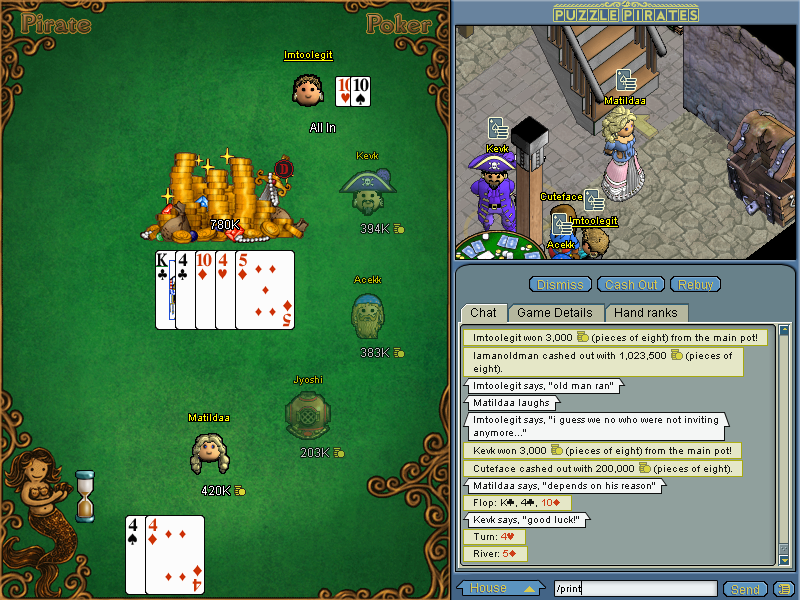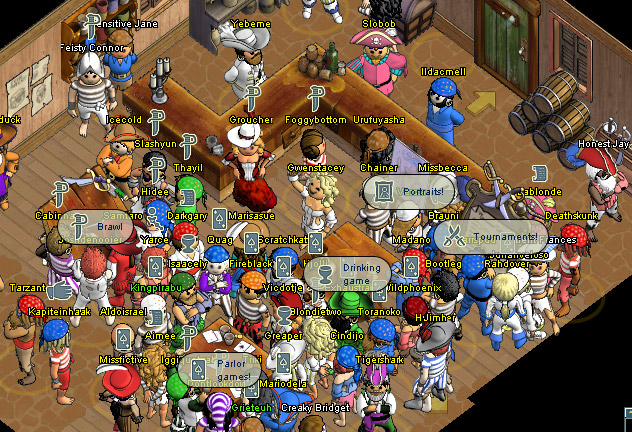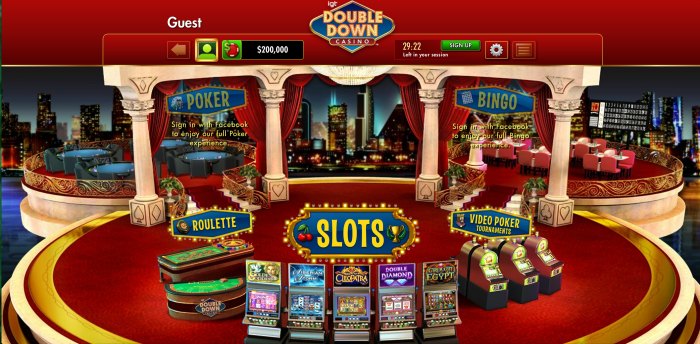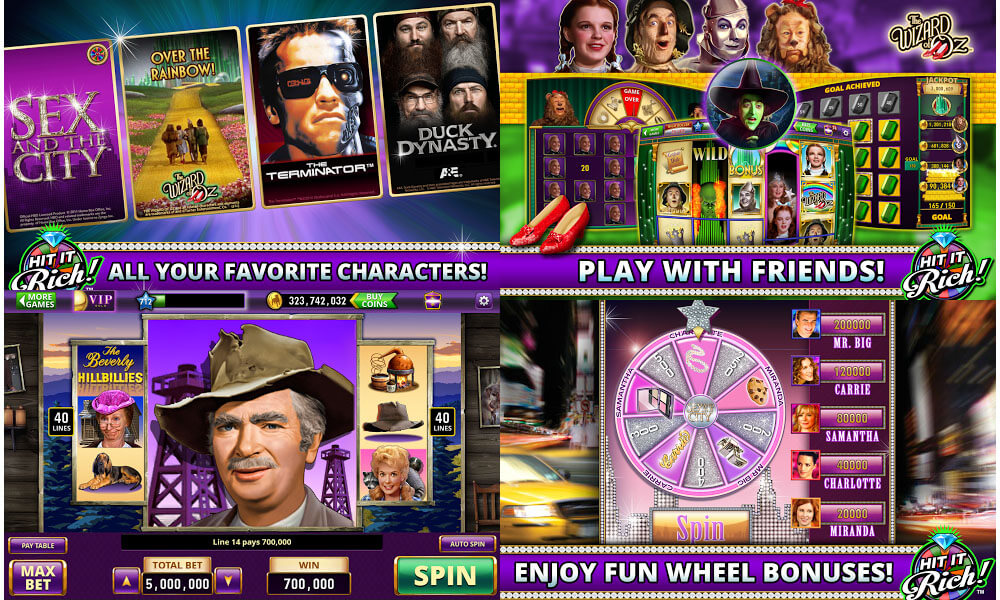FrankCanada97
Roughly the size of a baaaaaarge
According to the ESRB these are the descriptors given to gambling:

Let me tell you about an MMO I played for some time called Puzzle Pirates. It's a pirate themed MMO launched in 2003 where the majority of gameplay takes place in various puzzle minigames. The entirety of the game economy is player-run, prices of various items changed according to supply and demand. Imagine a simplified version of EVE Online. Characters were locked to one server and every server had their self-contained economy. The primary currency in game was called "pieces of eight" (PoE). You gained PoE by taking part in pirate pillages which is available to everyone.
Up until 2005, the majority of significant in-game actions was locked behind a subscription model. The developers introduced Free-to-Play servers and a premium currency called "doubloons". You can buy doubloons for around $0.20-$0.25 each, however doubloons are only sold in the following packages:
I've given you a basic idea of how money works in this game, so I'll get into the gambling. Players of Puzzle Pirates, when they're not on pillages (which is very often) congregate at the inn where they can play parlour games with other players. The games include Hearts, Spades, a pachinko-like game and poker. Players are freely able to wager PoE in these games. See where I'm going with this? The game was rated T for Teen for "simulated gambling" and "alcohol reference" when Ubisoft published it and later when it released on Steam. A problem gambler or someone who could become one, could be putting in a significant amount of real-world money to gamble with in-game money.
A recent check of the exchange rate shows a conversion of 1 doubloon for 9,000 PoE.

In the above screenshot, the pot is worth around $21 of real money. This is at a high-roller table (small blinds of 20k PoE, big blinds of 200k PoE) which makes up a majority of the tables populating the game. It would be easy for a vulnerable person who got a bad beat say "No problem, I'll just buy some more doubloons and convert those into PoE." And it would be easy, in comparison to just earning PoE through pillaging. When I last played, I was averaging around 5000 PoE per hour. That is if there is a good pillage being run at the moment and if you want to maximize how much PoE you earn, you better be ready to commit up to 4 hours of your time. Due to this, poker actually ends up being the most popular activity in the game at any given moment.
Here is where things become unclear. There is no way to actually cashout PoE into doubloons and then into real money. I guess that technically makes it "simulated gambling" instead of "real gambling". Otherwise, the game would have to be regulated like any other online poker site. This is something that kind of bothers me because, what we have is essentially gambling but technically isn't. Is buying in-game currency to gamble with using real currency gambling with real currency? I would hope that other much more popular MMO's don't have any thing similar to what is going on in Puzzle Pirates.
Real Gambling - Player can gamble, including betting or wagering real cash or currency
Simulated Gambling - Player can gamble without betting or wagering real cash or currency

Let me tell you about an MMO I played for some time called Puzzle Pirates. It's a pirate themed MMO launched in 2003 where the majority of gameplay takes place in various puzzle minigames. The entirety of the game economy is player-run, prices of various items changed according to supply and demand. Imagine a simplified version of EVE Online. Characters were locked to one server and every server had their self-contained economy. The primary currency in game was called "pieces of eight" (PoE). You gained PoE by taking part in pirate pillages which is available to everyone.
Up until 2005, the majority of significant in-game actions was locked behind a subscription model. The developers introduced Free-to-Play servers and a premium currency called "doubloons". You can buy doubloons for around $0.20-$0.25 each, however doubloons are only sold in the following packages:
In these servers, doubloons were added to the price of every item as a "delivery fee" and actions that were previously locked behind a subscription now needed "badges" that could only be bought with doubloons. However, you could exchange PoE for doubloons and vice versa at in-game banks. The conversion rate is dependent on the economy of the server.How much do doubloons cost?
Doubloons are available in the following packages:
$2.99 for 12 Doubloons (~$0.25 per doubloon)
$9.99 for 42 Doubloons (~$0.24 per doubloon)
$19.99 for 90 Doubloons (~$0.22 per doubloon)
$49.99 for 240 Doubloons (~$0.21 per doubloon)
$99.99 for 500 Doubloons (~$0.20 per doubloon)
I've given you a basic idea of how money works in this game, so I'll get into the gambling. Players of Puzzle Pirates, when they're not on pillages (which is very often) congregate at the inn where they can play parlour games with other players. The games include Hearts, Spades, a pachinko-like game and poker. Players are freely able to wager PoE in these games. See where I'm going with this? The game was rated T for Teen for "simulated gambling" and "alcohol reference" when Ubisoft published it and later when it released on Steam. A problem gambler or someone who could become one, could be putting in a significant amount of real-world money to gamble with in-game money.
A recent check of the exchange rate shows a conversion of 1 doubloon for 9,000 PoE.

In the above screenshot, the pot is worth around $21 of real money. This is at a high-roller table (small blinds of 20k PoE, big blinds of 200k PoE) which makes up a majority of the tables populating the game. It would be easy for a vulnerable person who got a bad beat say "No problem, I'll just buy some more doubloons and convert those into PoE." And it would be easy, in comparison to just earning PoE through pillaging. When I last played, I was averaging around 5000 PoE per hour. That is if there is a good pillage being run at the moment and if you want to maximize how much PoE you earn, you better be ready to commit up to 4 hours of your time. Due to this, poker actually ends up being the most popular activity in the game at any given moment.
Here is where things become unclear. There is no way to actually cashout PoE into doubloons and then into real money. I guess that technically makes it "simulated gambling" instead of "real gambling". Otherwise, the game would have to be regulated like any other online poker site. This is something that kind of bothers me because, what we have is essentially gambling but technically isn't. Is buying in-game currency to gamble with using real currency gambling with real currency? I would hope that other much more popular MMO's don't have any thing similar to what is going on in Puzzle Pirates.




